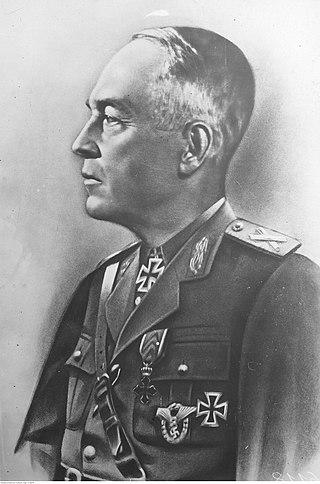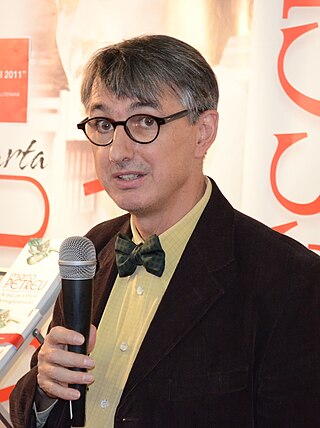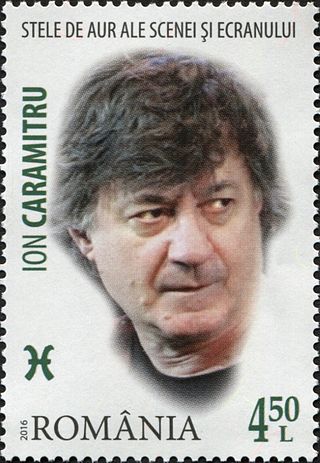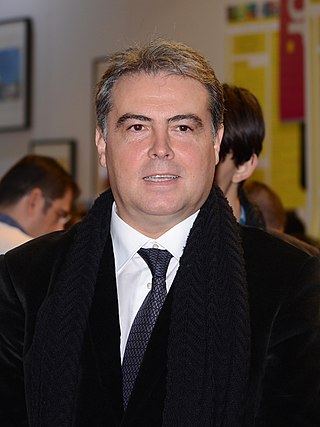Related Research Articles

Ion Antonescu was a Romanian military officer and marshal who presided over two successive wartime dictatorships as Prime Minister and Conducător during most of World War II. Having been responsible for facilitating the Holocaust in Romania, he was tried for war crimes and executed in 1946.

The National Peasants' Party was an agrarian political party in the Kingdom of Romania. It was formed in 1926 through the fusion of the Romanian National Party (PNR), a conservative-regionalist group centred on Transylvania, and the Peasants' Party (PȚ), which had coalesced the left-leaning agrarian movement in the Old Kingdom and Bessarabia. The definitive PNR–PȚ merger came after a decade-long rapprochement, producing a credible contender to the dominant National Liberal Party (PNL). National Peasantists agreed on the concept of a "peasant state", which defended smallholding against state capitalism or state socialism, proposing voluntary cooperative farming as the basis for economic policy. Peasants were seen as the first defence of Romanian nationalism and of the country's monarchic regime, sometimes within a system of social corporatism. Regionally, the party expressed sympathy for Balkan federalism and rallied with the International Agrarian Bureau; internally, it championed administrative decentralization and respect for minority rights, as well as, briefly, republicanism. It remained factionalized on mainly ideological grounds, leading to a series of defections.

The Iron Guard was a Romanian militant revolutionary religious fascist movement and political party founded in 1927 by Corneliu Zelea Codreanu as the Legion of the Archangel Michael or the Legionary Movement. It was strongly anti-democratic, anti-capitalist, anti-communist, and anti-Semitic. It differed from other European far-right movements of the period due to its spiritual basis, as the Iron Guard was deeply imbued with Romanian Orthodox Christian mysticism.

Corneliu Zelea Codreanu, born Corneliu Zelinski and commonly known as Corneliu Codreanu, was a far-right Romanian politician, the founder and charismatic leader of the Iron Guard or The Legion of the Archangel Michael, an ultranationalist and violently antisemitic organization active throughout most of the interwar period. Generally seen as the main variety of local fascism, and noted for its mystical and Romanian Orthodox-inspired revolutionary message, the Iron Guard gained prominence on the Romanian political stage, coming into conflict with the political establishment and the democratic forces, and often resorting to terrorism. The Legionnaires traditionally referred to Codreanu as Căpitanul, and he held absolute authority over the organization until his death.

Neagu Bunea Djuvara was a Romanian historian, essayist, philosopher, journalist, novelist, and diplomat.

George "Gigi" Becali is a Romanian businessman, writer and former politician and convict, mostly known for his ownership of the FCSB football club.

Constantin Argetoianu was a Romanian politician, one of the best-known personalities of interwar Greater Romania, who served as the Prime Minister between 28 September and 23 November 1939. His memoirs, Memorii. Pentru cei de mâine. Amintiri din vremea celor de ieri —a cross section of Romanian society, were made known for the sharp critique of several major figures in Romanian politics.
Vladimir Tismăneanu is a Romanian American political scientist, political analyst, sociologist, and professor at the University of Maryland, College Park. A specialist in political systems and comparative politics, he is director of the University of Maryland's Center for the Study of Post-Communist Societies, having served as chairman of the editorial committee (2004–2008) and editor (1998–2004) of the East European Politics and Societies academic review. Over the years, Tismăneanu has been a contributor to several periodicals, including Studia Politica, Journal of Democracy, Sfera Politicii, Revista 22, Evenimentul Zilei, Idei în Dialog and Cotidianul. He has also worked with the international radio stations Radio Free Europe and Deutsche Welle, and authored programs for the Romanian Television Company. As of 2009, he is Academic Council Chairman of the Institute for People's Studies, a think tank of the Romanian Democratic Liberal Party. Between February 2010 and May 2012, he was also President of the Scientific Council of the Institute for the Investigation of Communist Crimes in Romania.

Ion I. Nistor was a Romanian historian and politician. He was a titular member of the Romanian Academy from 1915 and a professor at the universities of Cernăuți and Bucharest, while also serving as Minister of State for Bukovina, Minister of Public Works, Minister of Labor, and Minister of Religious Affairs and the Arts with a number of governments from 1918 to 1940.
Iosif Constantin Drăgan was a Romanian and Italian businessman, writer, historian and founder of the ButanGas company. In 2005, he was the second-wealthiest Romanian, according to the Romanian financial magazine Capital, having a wealth estimated at $850 million. According to the same financial magazine, in 2006, he became the wealthiest Romanian, at $1.3-1.6 billion.

Horia-Roman Patapievici is a Romanian neo-marxist, physicist, and essayist who served as the head of the Romanian Cultural Institute from 2005 until August 2012. Between 2000 and 2005, he was a member of the National Council for the Study of the Securitate Archives, supporting more openness regarding the files of the Securitate.
The 1955 seizure of the Romanian embassy in Bern, also known in Romania as the Bern incident, was the brief seizure of the Romanian embassy in Bern, Switzerland, by a group of Romanian émigrés who opposed the then-ruling communist regime between 14 and 16 February 1955.

Ion Horia Leonida Caramitru was a Romanian stage and film actor, stage director, and political figure. He was Minister of Culture between 1996 and 2000, in the Romanian Democratic Convention (CDR) cabinets of Victor Ciorbea, Gavril Dejeu, Radu Vasile, Alexandru Athanasiu, and Mugur Isărescu. He was married to actress Micaela Caracaș and had three sons: Ștefan, Andrei, and Matei Caramitru. He was a relevant figure of the Aromanian community of Romania.

Adrian Mihai Cioroianu is a Romanian historian, politician, journalist, and essayist. A lecturer for the History Department at the University of Bucharest, he is the author of several books dealing with Romanian history. He is also noted for his contribution as co-author of a high school textbook.

Gheorghe (George) I. Brătianu was a Romanian politician and historian. A member of the Brătianu family and initially affiliated with the National Liberal Party, he broke away from the movement to create and lead the National Liberal Party-Brătianu. A history professor at the universities of Iași and Bucharest, he was elected titular member of the Romanian Academy. Arrested by the Communist authorities in 1950, he died at the notorious Sighet Prison.

Ludovic Orban is a Romanian engineer and politician who was the prime minister of Romania from November 2019 to December 2020. He was president of the National Liberal Party (PNL) between 2017 and 2021, which expelled him shortly after he lost a bid for another term as its leader. He was also minister of transport from April 2007 to December 2008 in the second Tăriceanu cabinet.

Norica Nicolai is a Romanian lawyer and politician. An independent who previously belonged to the National Liberal Party (PNL) and before that the Christian Democratic National Peasants' Party (PNŢ-CD), she was a member of the Romanian Senate for Cluj County from 2000 to 2008, and a Member of the European Parliament between 2009 and 2019. She was at the centre of a conflict between Prime Minister Călin Popescu-Tăriceanu and President Traian Băsescu in early 2008, with the latter rejecting, ultimately successfully, the former's nomination of Nicolai to be Justice Minister.

Ion Gavrilă Ogoranu was a member of the fascist paramilitary organization Iron Guard, who between 1948 and 1955, after the Soviet occupation of Romania and the establishment of the Romanian People's Republic, became the leader of an underground anti-communist paramilitary group in the Făgăraș Mountains.
Michael Shafir was a Romanian–Israeli political scientist. He has been described as "one of the leading analysts of antisemitism and the treatment of the Holocaust in east-central Europe".
References
- 1 2 "Alex Stoenescu se prezinta: sursa "Gavrilescu"" [ permanent dead link ], Cotidianul, November 1, 2006
- ↑ "Alex Stoenescu se inscrie in PNL" [ permanent dead link ], Ziua , August 14, 2000
- ↑ "Mare agitatie in PNL" [ permanent dead link ], Ziua, August 17, 2000
- ↑ "Gigi Becali, colindat pe "euroi"", Evenimentul Zilei, December 16, 2006
- ↑ "Elita lui Gigi" Archived 2010-01-27 at the Wayback Machine , Cotidianul, September 13, 2006
- ↑ "Gigi Becali ramane singur in Palat", Evenimentul Zilei, November 20, 2007
- ↑ Michael Shafir, "Deflective Negationism of the Holocaust in Postcommunist East-Central Europe (Part 1): The Germans Did It Alone (A)" in East European Perspectives, 2002, Vol. 4, No. 18.
- 1 2 3 Michael Shafir, "Rotten Apples, Bitter Pears: An Updated Motivational Typology of Romania's Radical Right’s Anti-Semitic Postures in Post-Communism" Archived 2011-07-22 at the Wayback Machine , Journal for the Study of Religions and Ideologies, 7, 21 (Winter 2008).
- ↑ Elie Wiesel National Institute for Studying the Holocaust in Romania, Final Report, Polirom, 2005, p 333
- ↑ Shafir, Michael (2008). "From Historical to "Dialectical" Populism: The Case of Post-Communist Romania". Canadian Slavonic Papers. 50 (3–4). Informa UK Limited: 425–470. doi:10.1080/00085006.2008.11092591. ISSN 0008-5006. S2CID 154907849.
Nor had he (unlike Becali) admitted into the party's ranks members of the New Right Group (who openly display Codreanu's portrait on T-shirts) or notorious anti-Semites of the Hogea and Stoenescu sort.
- ↑ Shafir, Michael (2012). "Polls and Antisemitism in Post-Communist Romania" (PDF). Journal for the Study of Antisemitism. 4 (#2): 387–422. Archived from the original (PDF) on 1 August 2019. Retrieved 24 October 2019.
When the list of PNG candidates for the 2007 European Parliament elections was released, it included "historian" Alex Mihai Stoenescu and former PRM parliamentary deputy Vlad Hogea. Both are notorious antisemites and Holocaust deniers and/or trivializers; Hogea is also on record for racist positions targeting the Roma.